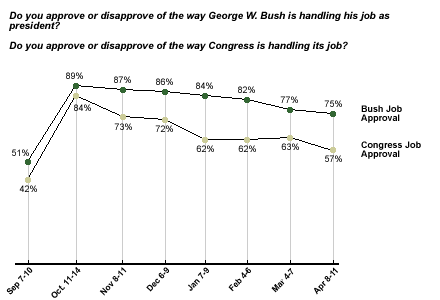While the president and Congress both received significant boosts in public approval following the Sept. 11 attacks, ratings for both have declined in the last few months. This is especially true for legislators, as an April 8-11* poll shows that 57% of Americans say they approve of the way Congress is handling its job, just six months after Gallup recorded an all-time high congressional approval rating of 84% in October 2001.
Given that ratings for Congress have historically lagged behind those for the president, it is not shocking that the post-Sept. 11 rally faded more quickly in its case. But the decline in public approval has been notably rapid. Just a month after reaching the high point of 84%, congressional approval dropped 11 points to 73% in November 2001. It fell another 11 points (to 62%) by January 2002, and is now 27 points below its high mark. Bush's ratings showed little decline until March 2002, and his ratings have fallen just 14 percentage points in the same time span.

President Bush's status as commander in chief of the U.S. armed forces and his role as the nation's leader have allowed him to transcend partisanship in the wake of Sept. 11. Even though his approval rating among Democrats is not as high as it once was, more than half of them (54%) still say they approve of the way he is handling his job as president.
But partisanship is more fundamental to Congress' day-to-day operations, as the legislative body itself is dominated by two opposing political parties, and currently is as evenly divided along partisan lines as it has ever been. Congressional decisions come about through partisan debate, so it is virtually impossible to avoid such battles on Capitol Hill, especially when domestic issues demand attention.
But the decline in public approval doesn't mean Congress is unusually vilified by Americans at this point -- it simply means the unusual political climate that the Sept. 11 attacks fostered is returning to normal. In fact, a majority of Americans still positively rate the jobs Republican and Democratic members of Congress are doing, with 59% approval for Republicans and 57% for Democrats, in an April 5-7 poll**. Both figures are the highest for the respective parties since Gallup began measuring this in 1999 -- good news for legislators as Congressional election campaigns gain steam.
*Results based on telephone interviews with 1,003 national adults, aged 18 and older, conducted April 8-11, 2002. For results based on the total sample of national adults, one can say with 95% confidence that the margin of sampling error is ±3%.
**Results based on telephone interviews with 1,009 national adults, aged 18 and older, conducted April 5-7, 2002. For results based on the total sample of national adults, one can say with 95% confidence that the margin of sampling error is ±3%.
